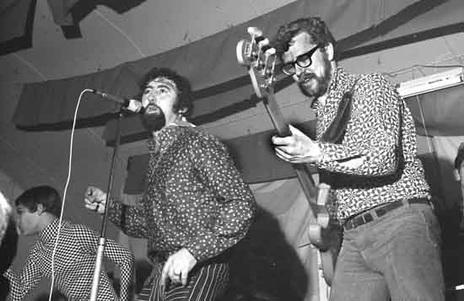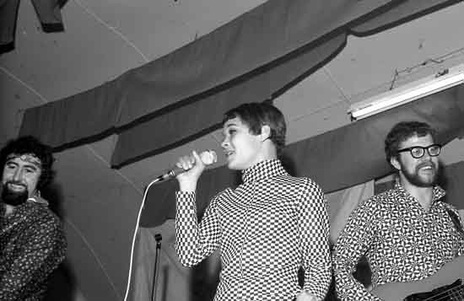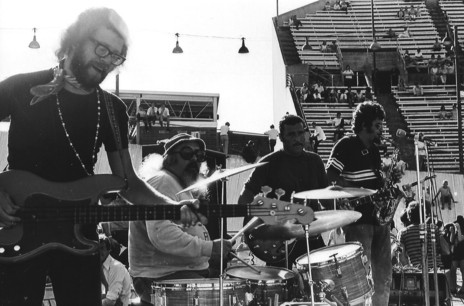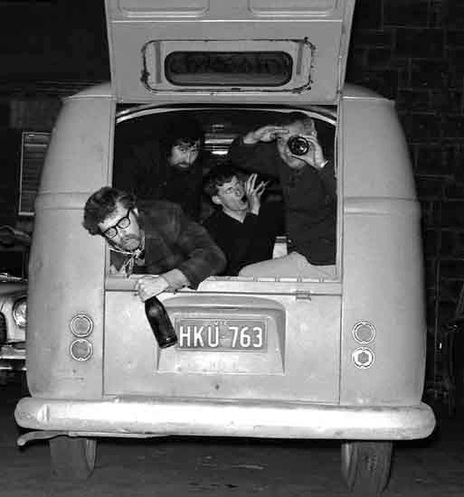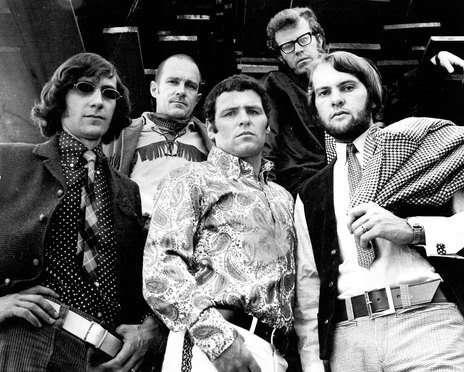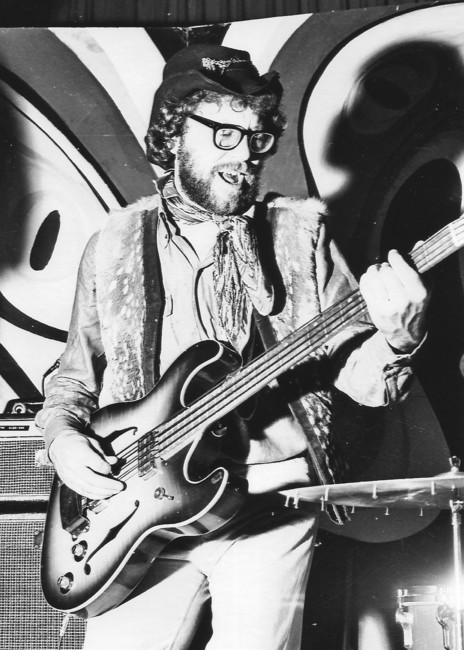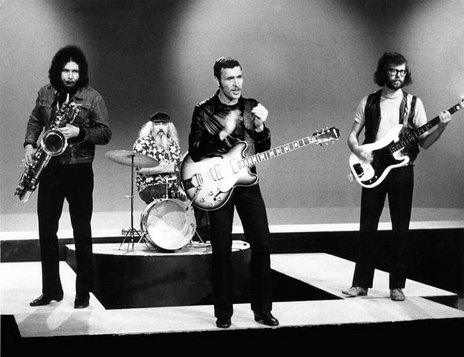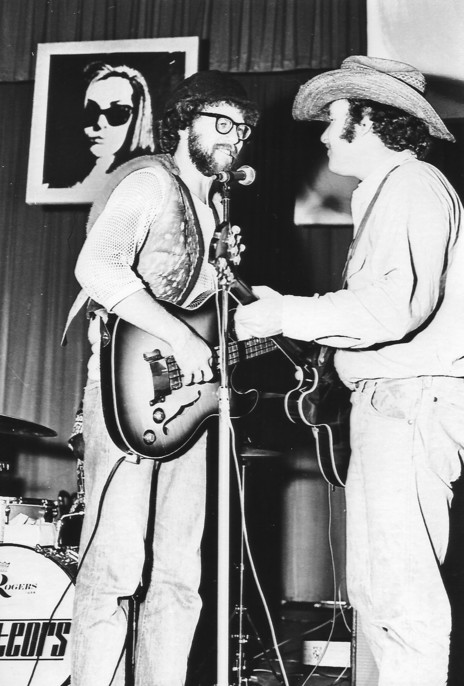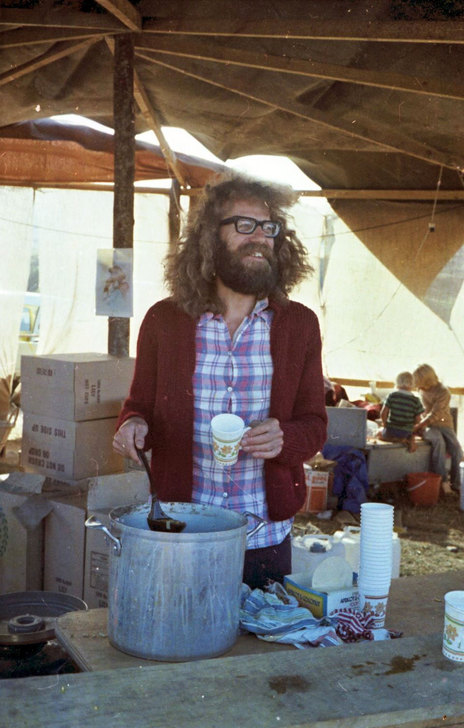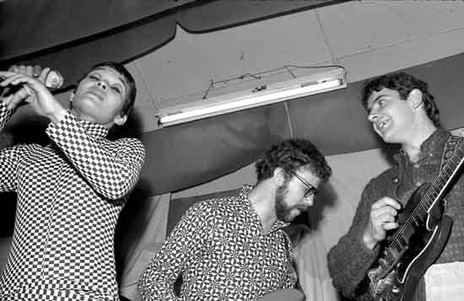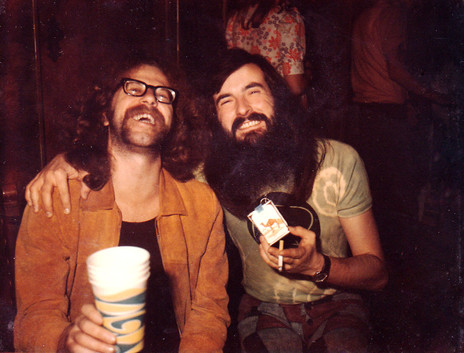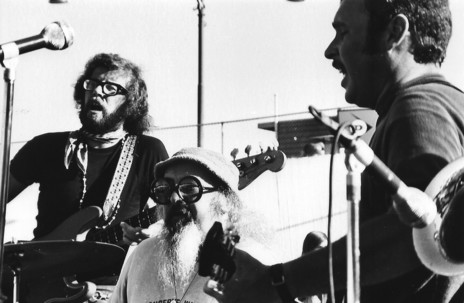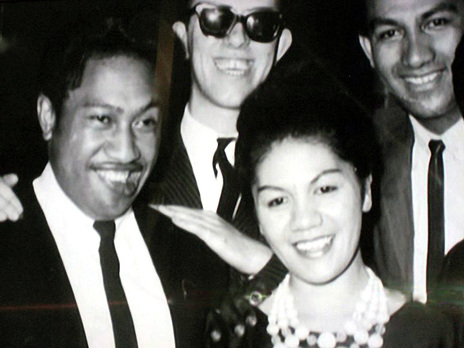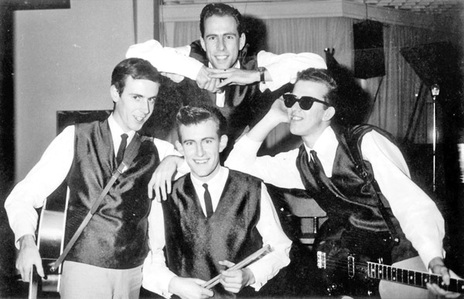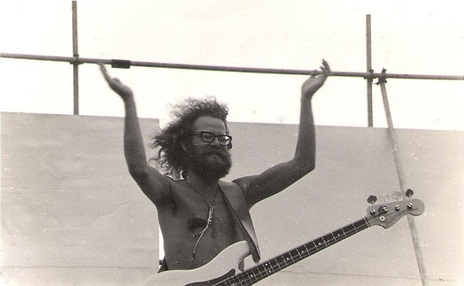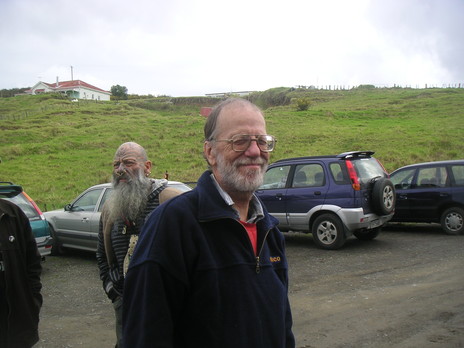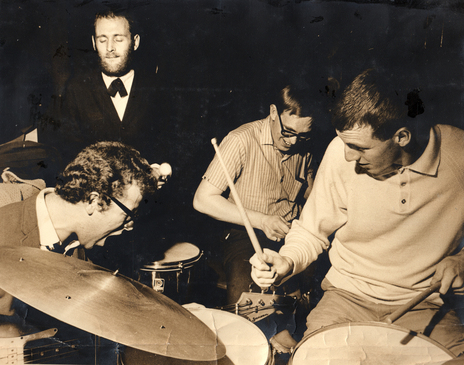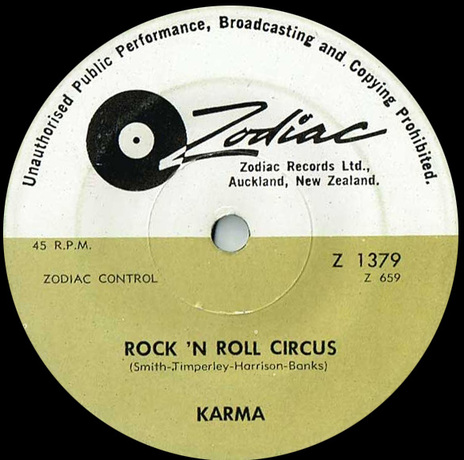He was horrified to see the bassist playing one-handed, his other hand clutching a pig’s head, clowning around, manoeuvring the head to “mime” to Adderley’s singing.
In 1964, headlining a package tour at the Dannevirke Town Hall, Tommy Adderley wondered why the crowd’s attention was focused to his left. Turning, he was horrified to see the bassist playing one-handed, his other hand clutching a pig’s head, clowning around, manoeuvring the head to “mime” to Adderley’s singing.
There have been some wild characters in NZ rock and roll but even some of them will tell you that John “Yuk” Harrison wrote the book.
In 1965 he toured with the Mike Perjanik Band, backing The Chicks, Eden Kane and headliner Sandie Shaw. It was the other support act for which the tour is remembered.
The Pretty Things rampaged through the country accompanied by a series of outraged headlines which New Zealand hadn’t experienced, before or since. Harrison teamed up with Viv Prince, the Pretty Things’ drummer who was largely responsible for the shock-horror headlines, and they were the tour’s genuine troublemakers, the pranksters and party animals, the boys at the back of the bus. Yuk lays claim to initiating one of the tour’s most notorious incidents, the half-hearted attempt to torch the stage curtains at the New Plymouth Opera House. “One of the ushers told Viv there was no smoking backstage. I told Viv to burn the place down.”
John Harrison was born in Auckland, December 29, 1942 – the right age to experience rock and roll’s first wave – but he had no musical aspirations. The teenager was a promising middle-distance runner, groomed by athletics guru Arthur Lydiard himself, but a poor academic attitude saw Harrison leave school at 14. He answered a newspaper ad for a job at Harmony House, the Upper Queen Street music store and musicians’ hangout. The manager asked him if he played guitar – he didn’t but he got the job anyway and learned the basics during his downtime. With his interests diversifying, Lydiard presented an ultimatum – either music or athletics.
A couple of days after he was dumped from the Kavaliers, two teenage musicians, Sonny Day and Bob Wynyard, entered Harmony House and offered Yuk a gig on bass with their fledgling band, The Sharks. Harrison shifted instruments very early, by default really, damaging a finger which prompted a part-time, full-time as it turned out, switch to bass guitar.
Harrison stayed with Sonny Day and The Sharks/Sundowners for two years, played a season in Sydney, and appeared on Bandstand, the Australian pop music show. But he wasn’t around when they began recording for Viking Records.
“An Aussie promoter organised a couple of weeks of work in Sydney and Bob Wynyard fired me just before we were due to leave. But the promoter said no Yuk, no Sydney! Mind you, Bob got rid of me when we got back to Auckland.”
The nickname, credited to pianist Mike Walker, originated when a group of “yucky” rock and roll musicians began frequenting the cliquey Montmartre jazz club. Harrison was considered the yuckiest of them all and the name stuck.
In 1962 The Sundowners was followed by The Embers, with whom Harrison recorded two albums. They were a popular backing band for solo artists, duos and vocal groups. Backing bands and recording sessions were to keep Yuk Harrison working throughout the 1960s, along with an alarming number of short-lived stints, including The Young Ones (later named Larry’s Rebels), The Dorados, Terry Dean and The Nitebeats, The Jimmie Sloggett Five, Bob Gillett’s Blue Blades and the latter-day Keil Isles.
As a session musician, Harrison can be heard on a multitude of familiar NZ recordings.
He toured the Pacific Islands in a Māori showband and was the bassist of choice for tour musical director Mike Perjanik, playing behind the Howard Morrison Quartet, Bill & Boyd, Dinah Lee, Peter Posa, Gene McDaniels, Gene Pitney and P.J. Proby.
As a session musician, Harrison can be heard on a multitude of familiar NZ recordings, including Dinah’s ‘Do The Bluebeat’, ‘The Hucklebuck’ by The Chicks and tracks by the Howard Morrison Quartet, Adderley, Posa, Gray Bartlett and Ray Woolf.
In 1963 Harrison was temporarily drafted into Ray Columbus and The Invaders, in between Puni Solomon and Billy Kristian, and was again called up the following year when Kristian took sick at a crucial time in the band’s career. He didn’t play on the recording but that’s Yuk, the bespectacled bassist bopping up a storm, on that familiar television clip of the Invaders performing ‘She’s A Mod’. Harrison once told Billy Kristian, “I’ve spent 40 years trying to live that down.” Kristian replied, “You have had 40 years living it down?”
Not surprisingly, following The Pretty Things tour, Perjanik sacked Harrison and he joined the resident band at The Embers nightspot, alongside Claude Papesch, Doug Jerebine and Bruno Lawrence.
In 1966 he was in The Brew, the experimental group led by Jerebine and Bob Gillett. “It was a pretty spaced out band,” Harrison recalls, “but I was pretty spaced out anyway. One day Doug had a go at me for not practising so I bought a box of beer and left it outside his bedroom door with a note – lighten up, have a beer. And I caught the next plane to Sydney.”
Yuk Harrison’s time with Max Merritt and The Meteors was to be the longest stint of his career.
Just days after arriving, Yuk was at the Whiskey Au Go-Go in Sydney and noticed Max Merritt and current Meteors bassist Billy Kristian having a furious argument at the bar. When Kristian stormed out, Harrison approached Merritt, who told Yuk that he needed a bass player. Yuk Harrison’s time with Max Merritt and The Meteors was to be the longest stint of his career.
Relocating to Melbourne, within months of joining Yuk emerged unscathed from a fatal motor accident which left the other three band members seriously injured, and he remained with the Meteors for three years as they became reputedly Australia’s highest-paid band, recording the hit single ‘Hey Western Union Man’ and the landmark Max Merritt and The Meteors album, while they gained a reputation as the hardest-working and hardest-living group on the scene.
“We all liked a drink,” Harrison remembers, “I was in my element. We’d do things like ... Stewie (Speer) would start a drum solo and we’d leave the stage and polish off half a bottle of whiskey, leaving poor old Stew up there for 20 minutes. We did that a few times, Stew wouldn’t be happy and that caused a few problems. One night (saxophonist Bob) Bertles fell off stage and we were always getting told off for swearing in between songs. But I was the fall guy! Mind you, no one could control me. I couldn’t control myself.”
In February 1970, Yuk Harrison was out of work but, as in NZ, it wasn’t for long. A band named Genesis was next. Touted as a “supergroup”, it featured well-established musicians, including singer Matt Taylor and guitarist Les Stacpool, and later Kiwis Reno Tehei and Tim Piper. “That came to an end,” Harrison says, “when I went into blackout and crashed and burned, leaving a bad taste all around.”
Harrison resurfaced in Sydney as a member of (Murray) Grindlay’s Choo Choo but was lured away to join the 10-piece Levi Smith’s Clefs, enjoying a lucrative residency at the premier nightspot Chequers.
The band was also engaged to back Shane Hales but Yuk decided to strip naked during ‘Saint Paul’, which led to ugly scenes.
There were other bands in Australia but in January 1972 Harrison was back in Auckland as a member of Karma, resident at Granny’s nightclub. With Harrison as main songwriter, Karma recorded three singles for Zodiac, and toured nationwide with Adderley’s Headband and with John Mayall’s Bluesbreakers. Karma’s last performance was at The Great Ngāruawahia Music Festival in January 1973.
The band was also engaged to back Shane Hales but Yuk decided to strip naked during ‘Saint Paul’, which led to ugly scenes.
Things were getting out of control for Yuk Harrison. A call by Reg Ruka took him back to Sydney but the gig didn’t work out and Harrison moved to Coolangatta for a year, chilling mostly but with the occasional gig. He played in a reformed Ray Brown And The Whispers, once one of Australia’s top bands, and spent three months in a West Australian residency. In NZ he was a member of the short-lived Andy Anderson Express before venturing to India in 1977, swearing off alcohol and the lifestyle which had grounded him.
Yuk Harrison was off the booze for 15 years before he resurfaced with a vengeance in 1992. He battled alcohol on and off throughout the decade but has settled back into sobriety. It goes without saying that he’s been through a few relationships but he’s a great-grandfather now, domiciled in rural New South Wales.
Harrison still performs now and again – most recently with the great Aussie singer Bobbi Marchini – and he has recorded with Tommy Ferguson and Doug Jerebine, but those wild wild days are long gone. Well, let’s hope so.
